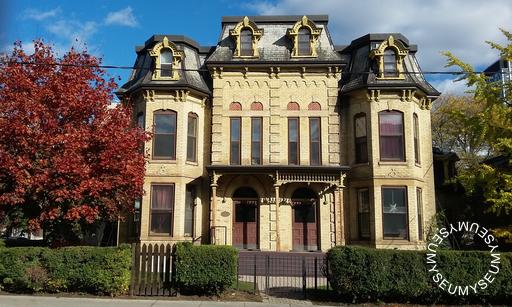How is this object or story important to you?
Standing at the corner of Beverley and D’Arcy Streets, I admire the house Mrs. Csók and her husband owned in 1937. William Lyon Mackenzie King and his family lived here in 1893 while he attended the University of Toronto, but I’m here to honour a less famous life. I imagine the factory workers returning from their shifts at the Swift meat factory in the West Toronto Junction, exchanging a quarter for a hot bowl of Mrs. Csók’s homemade goulash and a pastry eighty years ago. Elizabeth Csók made her own place in Toronto through hard work and entrepreneurial spirit. Born in Hungary in 1905, at eighteen she fell in love with a Catholic man despite the disapproval of her Presbyterian family. When the Treaty of Trianon divided Hungary in 1920, Elizabeth’s family lost their home. Fifty years later, she told historian Carmela Patrias, “My parents have house and grapes on the other side. They put the stamps on the money. When they get the money to Hungary from Czechoslovakia, it worth nothing.” So at twenty-one, she boarded a ship bound for Canada, where she married her fiancé. The Great Depression, illness, xenophobia, and language barriers kept Mr. Csók from finding a good job. Elizabeth’s options were also limited: employers often wouldn’t hire married women because they were considered unskilled and expected to raise children. Through ingenuity and hard work, she found a way to do both. When the Csóks moved to Toronto with their two young daughters in 1937, they saw an opportunity: a Hungarian restaurant on the corner of Beverley and D’Arcy Streets. She recalled, “Very old people owned it and it was for sale and we buy it. All the money that we have. So we start working in that restaurant.” They simply called it the Beverley Restaurant. Mrs. Buyer, the former owner and cook, taught Elizabeth how to run a business and how much meat to order from the Slovak butcher who spoke a little Hungarian. “Mrs. Buyer show me everything, how much, because I have no idea how to cook for that many people.” After a month, Elizabeth ran the kitchen with the help of another woman and a dishwasher from Quebec. Her husband, who had “no clue to do any cooking” and a waitress looked after the dining room. Forty years later, she remembered the Sunday menu with pride: homemade paprikash chicken, salads, coffee, and strudel for thirty-five cents.

